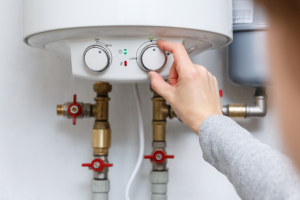A Comprehensive Guide to Water Heaters: Types, Features, and Benefits
A Comprehensive Guide to Water Heaters: Types, Features, and Benefits
Blog Article
Water heaters are essential appliances in modern homes, providing hot water for bathing, cleaning, cooking, and much more. Whether you’re upgrading a vintage unit or installing one initially, learning the different types of water heater robinson tx along with their features can help you make an educated decision that meets your needs and budget.
Types of Water Heaters
Storage Tank Water Heaters
Description: These are the most common type of water heater, featuring an insulated tank that stores a specific volume of hot water.
Pros: Affordable upfront cost and reliable performance.
Cons: Limited hot water supply; energy loss from standby heat.
Best For: Families with moderate warm water usage.
Tankless Water Heaters (On-Demand)
Description: Heats water directly because it flows with the unit, eliminating the requirement for a storage tank.
Pros: Energy-efficient, unlimited domestic hot water, and compact design.
Cons: Higher upfront cost and may even struggle to supply multiple fixtures simultaneously in large households.
Best For: Homes rich in energy efficiency priorities and smaller spaces.
Heat Pump Water Heaters (Hybrid)
Description: Uses electricity to go heat from your air or ground to heat the lake, rendering it highly energy-efficient.
Pros: Lower energy consumption in comparison to traditional electric water heaters.
Cons: Higher initial cost and slower heating process.
Best For: Eco-conscious homeowners in moderate climates.
Solar Water Heaters
Description: Uses solar panel systems to capture energy from your sun to heat water.
Pros: Eco-friendly and significantly reduces energy bills.
Cons: High upfront cost and reliance upon sunny weather.
Best For: Homes in sunny regions having a commitment to sustainability.
Condensing Water Heaters
Description: Designed for homes using gas, these units capture and reuse exhaust heat to heat water efficiently.
Pros: Energy-efficient and is effective in high-demand households.
Cons: Limited to homes with access to natural gas.
Best For: Large families with high hot water usage.
Key Features to Consider
Capacity
For storage tanks, choose a size based on household size and water usage. Common capacities range from 30 to 80 gallons.
For tankless systems, take into account the flow rate (measured in gallons each and every minute) had to meet simultaneous demands.
Energy Efficiency
Look for your Energy Factor (EF) or Uniform Energy Factor (UEF) ratings. Higher values indicate greater efficiency.
ENERGY STAR-certified models ensure energy savings and environmental friendliness.
Cost
Consider the upfront cost and long-term energy savings. While tankless and hybrid models could have higher initial prices, they are able to reduce energy bills with time.
Installation Requirements
Some models, like tankless and solar heaters, require specialized installation, which can add to the overall cost. Ensure compatibility using your home’s plumbing as well as system.
Maintenance
Regular maintenance extends the lifespan of your water heater. This includes flushing tanks to remove sediment and inspecting components for wear and tear.
Benefits of Modern Water Heaters
Convenience: On-demand access to warm water improves daily living comfort.
Energy Savings: Advanced technologies like tankless and heat pump systems lower energy consumption.
Longevity: Modern units will have a lifespan of 10-20 years, according to the type and maintenance.
Space-Saving Designs: Compact models like tankless units are fantastic for smaller homes.
Tips for Choosing the Right Water Heater
Assess Your Needs
Determine your household’s peak warm water demand and choose a system that could handle it efficiently.
Factor in Energy Costs
Compare the operating costs of models to get the most economical option with time.
Consult a Professional
A licensed plumber or contractor can provide guidance on selecting, installing, and the best system for your residence.
Conclusion
Investing within the right water heater is crucial for ensuring comfort, efficiency, and long-term personal savings. Whether you prioritize energy efficiency, capacity, or sustainability, there’s a water heater to fulfill every need. By comprehending the available options and their features, you can create a choice that keeps your property running smoothly as well as your water warm year-round.